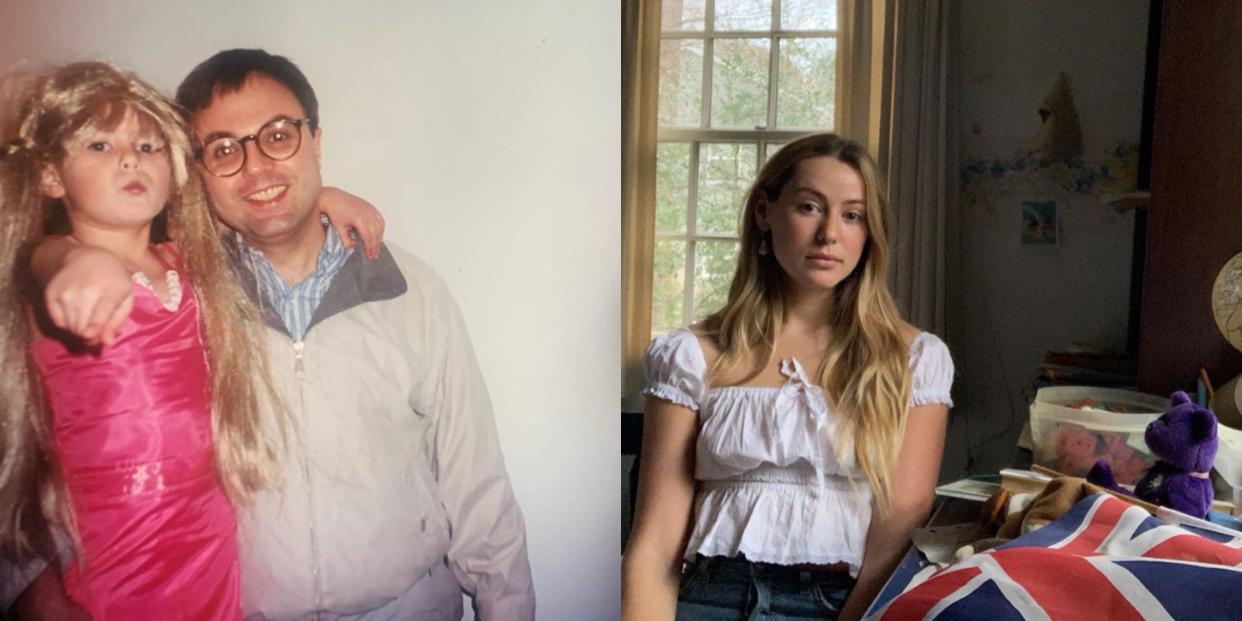In the heartbreaking 3rd installment of 'I Am Caroline Calloway,' the influencer talked candidly about her father's death

Caroline Calloway/Instagram
Warning: This story contains mention of suicide and graphic content.
Writer, artist, and influencer Caroline Calloway has penned an essay titled "I Am Caroline Calloway."
The essay has been billed as Calloway's formal response to a piece published by The Cut last year, in which her friend and former collaborator Natalie Beach chronicled what she said was a toxic working relationship.
The essay's release has been a dramatic, multi-part affair, with a new installment dropping every Tuesday.
Part Two And A Half debuted on April 14 and focused mainly on the author's difficult relationship with her late father.
The third installment of "I Am Caroline Calloway" was released Tuesday afternoon. And it is, by far, the writer's most moving work to date.
According to Calloway's original schedule for the essay's multi-part release, this installment was going to be the last. Instead, she announced her decision to turn Part Three into Part Two And A Half, with Part Three "coming soon."
Part Two ended with a series of emails sent between Calloway and Natalie Beach, her former ghostwriter and collaborator. On September 4, 2019, Beach sent Calloway an email letting her know she had written an essay about her experience working with Calloway, "and as such someone from The Cut might reach out to you with fact checking questions."
The same day, Calloway says she received an unexpected call from her father that would be their final conversation.
"Two days later he killed himself," Calloway wrote. "Four days after that, Natalie's essay was released to the world and my life changed forever, again."
In Part Two And A Half, Calloway attempts to trace the final weeks of her father's life.
His exact date of death is not known. Medical examiners, however, declared his passing a "definite suicide" that likely occurred "around the fifth, sixth, or seventh of September."
Calloway went on, saying that "about three weeks before he died," he called the local police department in Falls Church, Virginia "saying that 'his life was over.'"
"He asked the cops to take him to 'a homeless shelter,'" Calloway wrote. "Officers picked him up at the house where I grew up and took him to a mental hospital instead."
During his two-week stay at the hospital, Calloway's father kept a journal, she says, which she later found while cleaning out his house after his passing. In his journal, he kept a log of the medications he was taking and the songs he liked best when they played over the ward's speaker system. He also noted his observations of the hospital staff and some of his interactions with fellow patients in group therapy.
"In his journal from the mental hospital he writes about me not once," Calloway added.
When her father's allotted two weeks at the hospital came to an end, Calloway wrote, he petitioned a social worker to continue his state-subsidized emergency treatment. Calloway said she would not have believed this "if it weren't in writing," because her father had "refused help his entire life" and "always denied that he even had a problem."
"He wanted to move into a group-home for mentally-ill men," she said. "This would have been free for him — a type of life-saving healthcare covered by the state of Virginia — which was key because he was bankrupt."
Calloway noted that, although her father hadn't formally filed for bankruptcy yet, he'd taken out "refinanced mortgage after refinanced mortgage to keep the credit card debt-collectors at bay." But, "on paper," he appeared to be "an Exeter-educated, Harvard-educated white male home-owner who had never received any kind of mental health treatment until two weeks ago."
This outward appearance is perhaps why, "about a week" after asking to continue his treatment in a group home, "his petition was denied."
"He was released," Calloway wrote. "He called me. Two days later he died."
When Calloway's father called her days before his death, she was sitting in her West Village apartment digesting Natalie's "heads up" email. It was, Calloway noted, the "first time he had called me in years."
"Over the past few years, the reclusive introvert I knew as a child had morphed into a paranoid agoraphobe and he'd stopped contacting me altogether," Calloway explained.
Calloway recalled "how cheerful — how buoyant — he sounded" during that final phone conversation. Calloway believes her father "still wanted to live" at that point, because the same day he ordered CDs of all the new music he'd discovered at the hospital. He told her during this call that "things are going to get better," and that he was "proud" of her. The conversation was brief because Calloway was "so overwhelmed by all the feelings Natalie's email had whipped up into a frenzy inside of [her]."
"A few minutes after we hung up, I called back," Calloway continued. "I needed money."
Calloway said she hadn't asked her father for money "in years," but "going viral in January had all but sunk [her] financially." Before her creativity workshops were derided as "scams," Calloway said ticket sales were "booming." So much, in fact, that she had secretly planned to use the extra income to "hire a professional organizer" to clean her father's house as well as a therapist who would be willing to do house calls for him. The trauma of being publicly shamed, however, left her "too emotionally broken to work. She came close to eviction during this period because she "chose to pay for therapy instead of rent."
Thankfully, Calloway's father didn't answer her follow-up call. Instead, Caroline's final words to her father were "I love you."
"The last thing he said to me was: I love my Sweetsie Girl!" Calloway wrote.
Update: This post has been updated to remove certain graphic details.
Read more:
Read the original article on Insider

